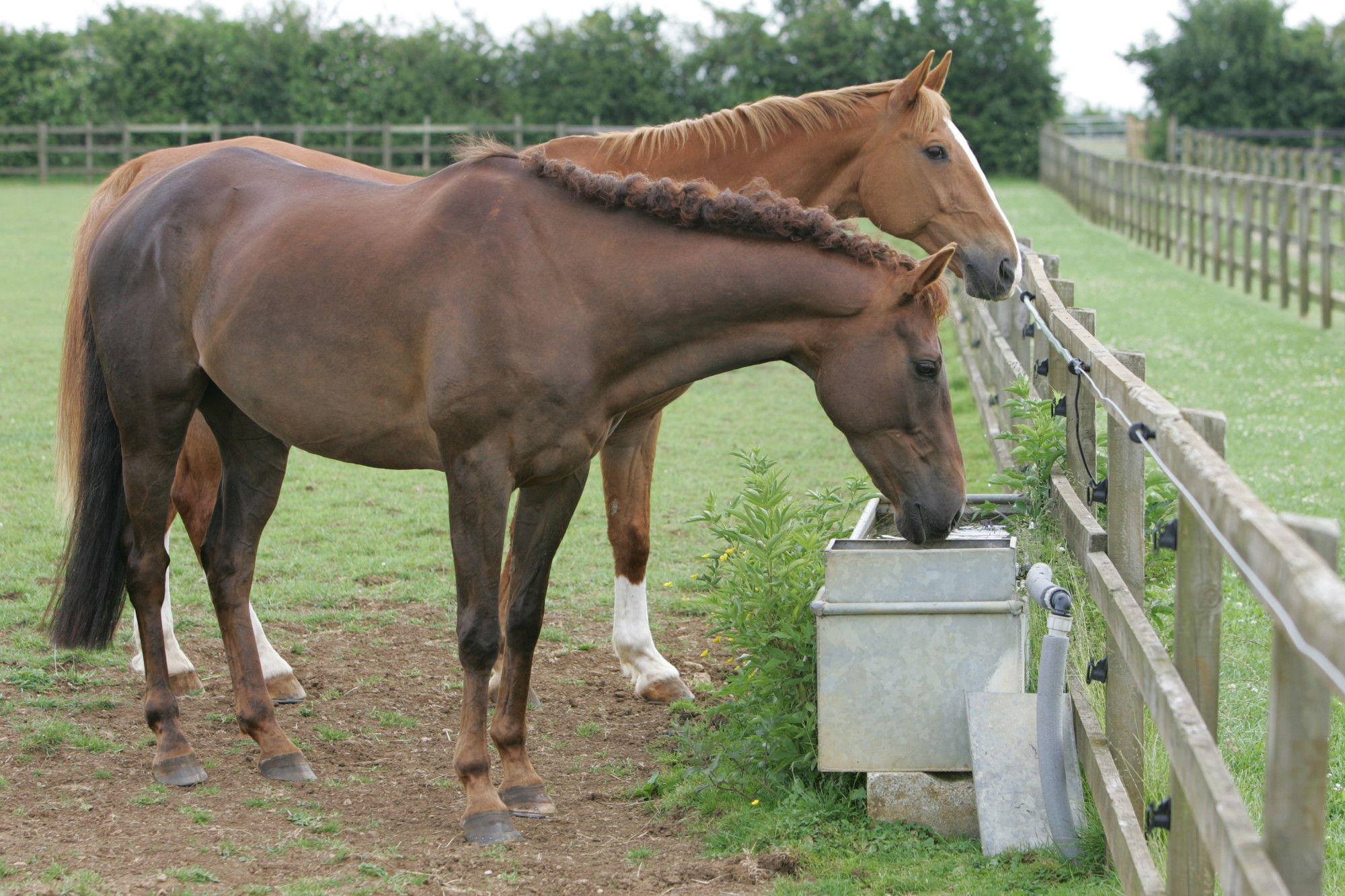
Horse feeding and watering
As trickle feeders, horses spend between 14 to 20 hours a day browsing and grazing on a fibre-based diet.
A horse’s natural diet includes a variety of grasses ranging in type and age, from fresh growth to older rougher stalks, as well as other herbs and weeds. Old pasture is ideal for most field-kept horses, with only supplementary hay needed in the winter months. Horses should also have constant access to clean, fresh water.
Old pasture is ideal for most horses and ponies with only supplementary hay needed in the winter months. However, the natural variety of grass and herbage is often lost in a modern sown pasture, where one or two nutrient-rich grass types and clover may dominate.
What should you feed your horse?
Horses need to be fed as closely as possible to the natural diet they evolved to eat. This is a high-fibre, low-sugar diet with the chance to graze on different grasses, herbs, non-toxic hedgerows and trees.
This type of diet will give your horse the nutrition they need and will satisfy their instinct for foraging, keeping them happy and reducing boredom. Following a more natural diet may also help to prevent illnesses like stomach ulcers and colic.
Note
Most horses doing light or medium work (such as hacking and schooling) just need good pasture or hay, made up of a variety of different grasses, with little to no supplementary feed.
When does a horse need supplementary feed?
When feeding a horse, you should consider the type and quantity of grazing they have access to. Grass is often overlooked when considering a horse’s ration, but it’s the bulk of the diet for most horses. Whether fresh (on a grazed pasture) or fed as conserved forage (hay or haylage), grass is most important for providing energy, nutrients and fibre.
Supplementary feeding only needs to be considered if your horse is underweight, elderly, in hard or fast work or for breeding stock.
Note
In modern sown pastures, the natural variety of grass and herbs are often lost. In these cases, they are usually dominated by a few nutrient-rich grasses and clover.
Types of supplementary horse feed
Fibre and roughage
Fibre is essential to maintaining good digestive function. Grass should be your horse’s primary source of fibre. During the grazing season, the fibre content of grass increases – it’s higher in more mature grass, which is also conserved as haylage or hay. In the winter this provides high-fibre feed when a horse may not have access to grazing.
When managed correctly, grass can provide a balanced diet from spring through to autumn. During the winter the energy content of the grass falls – this is why it’s sometimes necessary to supplement a horse’s diet with hay, haylage, grass pellets or straw.
Concentrates (hard feed)
Concentrates are foods with concentrated levels of nutrients and energy. Concentrates should make up only a small percentage of a horse’s diet – this amount will depend on your horse's condition and level of work.
Cereal and grains
Cereals and grains – such as oats, wheat and barley – are often rolled, crushed, bruised or heat-treated to increase their digestibility. They are naturally high in energy and are best suited to horses in hard work, such as competition horses. They are not suitable for horses in light work.
Compound feeds
Compound feeds come in the form of nuts (cubes or pellets) and mixes. They are a blend of ingredients that make up an all-in-one feed. Compound feeds come in a wide range of recipes to suit the needs of particular types of horses and ponies, such as those that are competing or elderly horses.
Details of the nutrient components should be available on the packet. You can also contact the manufacturer for feeding advice, as well as help on choosing the right compound feed for your horse.
Succulents
Soaked sugar-beet pulp, apples and carrots are a useful source of vitamins and minerals. They’re also good for bulking a ration as well as tempting fussy feeders. A horse with access to grass should receive sufficient succulents but your horse may benefit from a small amount of additional succulents in the winter months, or if they are on restricted grazing. You should never give grass clippings as these are toxic.
Supplements and feed balancers
If necessary, horses can be fed additional supplements alongside roughage and hard feed. They can be used to aid digestion, boost their condition or provide additional vitamins and minerals. Older horses may especially benefit from supplements as well those on restricted grazing or weight loss diets.
Supplements come in many forms, including balancers, mineral blocks, powders and oils. Be sure to speak to your vet or an equine nutritionist before feeding any supplements.
Important
Make changes to your horse’s diet and routine gradually ‒ sudden changes can upset a horse's gut bacteria, increasing the risk of colic. Speak to your vet or an equine nutritionist before making changes to your horse’s diet.
Water
Horses drink approximately 25 to 55 litres of water per day depending on the weather, their diet and the level of work they are in. They should have access to fresh, clean water at all times to prevent dehydration.
Water in the field
Water in the field can be provided in a self-filling trough made from galvanised iron or reinforced plastic. Large tubs or buckets can also be used. Throughout the year you’ll need to maintain both daily. Algae will need to be scrubbed out in summer, while ice will need to be broken and removed in winter.
If you're using non-automatic water sources, you should check these multiple times a day to ensure your horse has not run out of water.
Note
Natural water sources, such as streams or ponds, are not always safe for your horse to access or to drink from. An alternative source of water should always be offered instead.
Water in the stable
At least one bucket of fresh water should always be provided in the stable. These should be made from plastic or rubber to avoid injury. Buckets can be placed within an old tyre to prevent your horse from knocking them over. Water should be changed at least once a day as it will absorb the ammonia in the stable – this may put some horses off drinking.
Alternatively, automatic drinkers can be fitted in the stable, though some horses choose not to drink from them. It can also be difficult to know how much your horse is drinking from these. Both buckets and automatic drinkers should be scrubbed out daily.
Rules of feeding and watering horses
Feed a fibre-based diet and only supplement it with hard feed if absolutely necessary
Horses need to be fed as closely as possible to the natural diet they evolved to eat, which is a high fibre, low sugar diet.
Feed your horse according to their needs
Consider your horse's age, type and workload. You should avoid feeding your horse unnecessarily to prevent them from becoming overweight. Likewise, you must ensure they are getting enough to eat. For example, elderly or pregnant horses may require supplements to help them maintain their weight, especially in winter.
Feed little and often
Divide rations up into smaller feeds throughout the day. A horse’s stomach is designed to accommodate small meals throughout the day.
Store feed correctly
Horse feed can deteriorate or go out of date if it’s not stored correctly, making it unsafe for feeding. Make sure feed is stored safely vermin-proof bins to prevent it becoming contaminated.
Keep feeding equipment clean and tidy
Wash and dry feed bowls and equipment after every use.
Ensure a constant supply of clean fresh water is always available
Horses should have access to fresh, clean water at all times, whether they are stabled or in the field.
Make changes gradually
Sudden changes to your horse’s diet can upset your horse’s gut bacteria, which can lead to colic. Make dietary changes slowly over a period of time by gradually introducing any new food and reducing any being removed from your horse's diet.
Maintain a consistent feed routine
Horses are creatures of habit and appreciate a consistent feeding routine, including being fed at the same time every day. Maintaining this schedule will also help you to space out meals throughout the day.
Feed good quality, clean food
Feeding low-quality or out of date food may be harmful to your horse’s health, costing you more money in the long run.
Leave at least an hour between feeding and riding
If your horse has eaten hard feed, allow it some time to be digested before your horse is worked.
Feed something succulent every day
When the grass is not growing or if your horse has restricted grazing, your horse may benefit from some form of succulent such as apples or carrots. This is especially helpful in winter.
Page details
Reviewed
• 30 June 2023
Next review
• 30 June 2026








